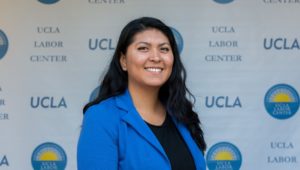“If I were to imagine a better world, it would be one where we recognize the humanity of people and see value in them regardless of the background they carry.”
Montzerrat (Montze) Garcia Bedolla is a leader who deeply values community, social justice and health equity. She began her career with YLI in 2015 and is now the Program Manager for the San Mateo County office. She has coordinated and contributed to youth campaigns for alcohol prevention, tobacco prevention and more recently transportation.
Montze’s interest in social justice and health equity is closely tied to her personal story. She was born in Mexico and moved to Santa Ana, CA when she was eight years old. “I grew up in a Mexican household and both of my parents didn’t speak English so I became fluent in Spanish. Growing up I had to do a lot of code switching and translating for my parents. I felt that I had to grow up fast in order to meet the needs of my family as a first generation college student. I had to make sure I was on top of my work and make sure that my parents had what they needed. I was also raised to not settle for less, to know I am deserving of more and to take advantage of the opportunities that would come my way.”
“Social justice is an opportunity to use your voice, to exercise your rights, to know you deserve better and you deserve an opportunity to thrive.” For Montzerrat, social justice is the tie that binds her identity as a child of immigrants, as an advocate of youth, and as a public health practitioner.
Throughout high school and college, Montze became more engaged in her community and was an activist who spoke out about anti-immigration sentiment. The support she received through these experiences has influenced the work she does now with youth leaders. “It’s not common for people to come along and say to a young person that they are a leader and that their experiences matter. Having people invest in me throughout my life and having really supportive adult allies, I now see the kind of impact they’ve had on my life and I am hoping to be able to impact other young people too. It’s about opening up opportunities for youth and thinking about where we can crack open a door for them to succeed in their dreams, whether they want to go to college, start a career, or do both. I hold on to the youth-adult partnership piece because it really does work.”
Transportation justice is one of the main projects Montze and other YLI youth leaders are focusing on in San Mateo County. “The young people are the ones riding the buses and walking the streets to get to school, to work, or to the mall. Young people have a better idea of how the public transit system works, how it can be improved, which bus lines work better, and which bus stops are more efficient. There is a disconnect between youth and the decision-making body, who are experts in their field, but who lack the community engagement or even the experience riding the transit system. So we work to create those partnerships for young people to make changes with their community leaders. The issues can be anything, whether its immigration, affordable housing, or access to healthy foods, but the skills and knowledge they’ve gained can help them to make changes and make the world a better place. Youth are the future and we rely on them to carry us through to a different world or to imagine a different place than what they are accustomed to.”
Montzerrat’s passion and commitment to equity extends through her personal, professional, and political life. She is working to improve opportunities for immigrant youth at YLI, and she is also working to improve the lives of immigrants through the year-long Health Ambassador Fellowship of UCLA Labor Center. “It’s the first group to work on the intersections of access to healthcare and immigrant rights, which look into the type of access to health services or healthcare insurance that immigrant communities completely lack under the ACA. The one thing that stays the same is the lack of healthcare for the group of people who don’t have citizenship. I’m positioned in Sacramento for this work and I see first-hand the experiences of what it is like to not have health care. I also have seen this in my own family and have had many instances of going to the hospital and not having the insurance or funds to pay for the services, or not being able to afford being sick and having to rely on more traditional remedies. A lot of this work is helping immigrant communities get through these problems. In Sacramento there’s an actual safety net program and I’ve been enrolling people in the program and helping them get access to some limited services.”
Montze is passionate about building a better future for youth and immigrant communities. “The most rewarding part of the work is definitely working with young people and learning from them. Especially in these current times, people have a lot of apathy and feel that there’s a lot at stake. Youth remind me that there’s a reason why we do all this, that there is actually hope and an opportunity to do something to support them to develop the tools they need to create a more just and equitable future. It’s really fun working with youth although you don’t always see the rewards right away, I know I am planting the seeds for them to have meaningful rewards in the future.”

